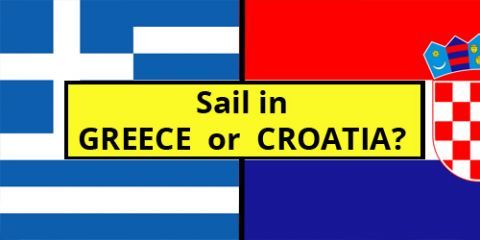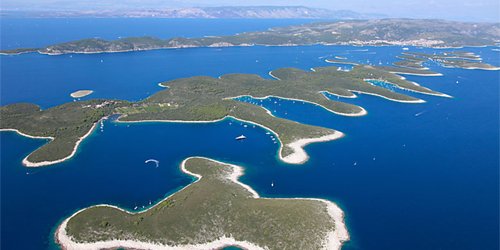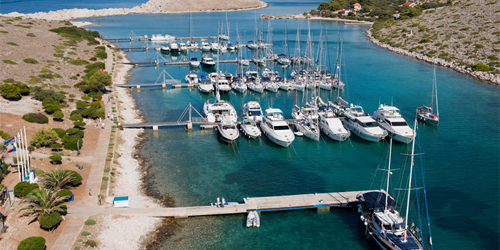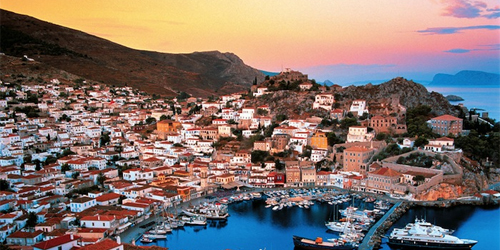Sail in Greece or Croatia?
People rave about sailing in Greece AND Croatia, so you’ll clearly have a brilliant time regardless of wherever you choose to sail, but what are the key differences between them? Here’s our quick guide with a few key points!

Climate
Greece is further south than Croatia, so it’s closer to the equator, and temperatures are a few degrees hotter down there.
Of course, it depends on what sort of temperatures you like to sail in, but for the average Joe, Greece is a nicer place to be on holiday (sunshine-wise) in May, June and September, because it’s a few degrees warmer than in Croatia, and the sea is that bit warmer.
However, that potentially changes for July and August, when temperatures in Croatia get plenty hot enough and you wouldn’t like to be a few degrees warmer. Temperatures can get a bit stifling in Greece, which means you’ll build up a sweat just by standing still. Our country guides give a little more information on what weather to expect in Greece and Croatia.
Islands to explore
 Both Greece and Croatia have hundreds of islands to explore, and it’s super-relaxing to head out on the blue yonder and go island-hopping for the week.
Both Greece and Croatia have hundreds of islands to explore, and it’s super-relaxing to head out on the blue yonder and go island-hopping for the week.
In Croatia, you’ll find the Dalmatian islands dotted right along the coastline, from Pula in the north, Split in the centre, and to Dubrovnik in the south. As a general rule, the islands tend to be more natural (and less inhabited) than in Greece, and a little closer together than in Greece.
In Greece, there’s plenty of different groups of islands to choose from, which means there’s a lot more variety to the sailing, and you won’t find yourself just heading up the coastline. The scenery is a little more stunning than in Croatia, with white cliffs, turquoise seas, green forests and delightful beaches making them among the most beautiful islands in the world.
Fishing villages or small towns tend to be cuter and prettier in Greece than in Croatia (but they’re still pretty cute in Croatia!) You can read our destination guides to get a good idea of where to sail.
Sailing infrastructure
 People have been sailing in Greece for centuries - if not longer - whereas Croatia has a slightly more chequered recent history – which goes some way to explaining the differences in sailing infrastructure you’ll find in each country.
People have been sailing in Greece for centuries - if not longer - whereas Croatia has a slightly more chequered recent history – which goes some way to explaining the differences in sailing infrastructure you’ll find in each country.
In Greece, you’ll find harbours with great history – for example, you can sail to the same harbour in Rhodes where the Colossus of Rhodes once stood, and recreate voyages from the ages – when you’re not sailing past a town, you’re getting pretty much the same views as the Ancient Greeks once did, or the Medieval crusading knights!
Contrast that with Croatia - the country only became independent from Soviet rule in 1991, and most of the marinas are purpose-built for modern-day sail-tourism (and more are being developed every year). That means they have all the mod cons - like wifi and great toilet facilities – and are generously sized, so there’s plenty of space for all the yachts. The Croats have also had time to plan where they put their marinas – so there’s some, like Piskera in the Kornati islands, which aren’t even located near a town.
Prices
 You can use our search tool (the pink box) to get live prices and availability for chartering in Greece and Croatia. Generally, you’ll find that the cost of chartering a yacht or catamaran is higher in Greece than in Croatia – often by a few hundred euros.
You can use our search tool (the pink box) to get live prices and availability for chartering in Greece and Croatia. Generally, you’ll find that the cost of chartering a yacht or catamaran is higher in Greece than in Croatia – often by a few hundred euros.
However, there’s also a difference in the cost of mooring or berthing fees between the two countries. A spot in a marina in Croatia can set you back upwards of €60, whereas you’ll likely only be charged €15 in Greece – In Croatia, you’re helping to pay-back the recent development costs of the marina’s, whereas in Greece, they’re just happy to have you there to support their local shops and restaurants, and they have to have a town harbour for getting stuff in for the locals anyway.
So if you’re planning on spending many nights in a marina, then it’s possible that sailing in Greece will actually work out cheaper (or, at least, shouldn’t be ruled out on grounds of costs. Of course, anchoring is free in both countries.

